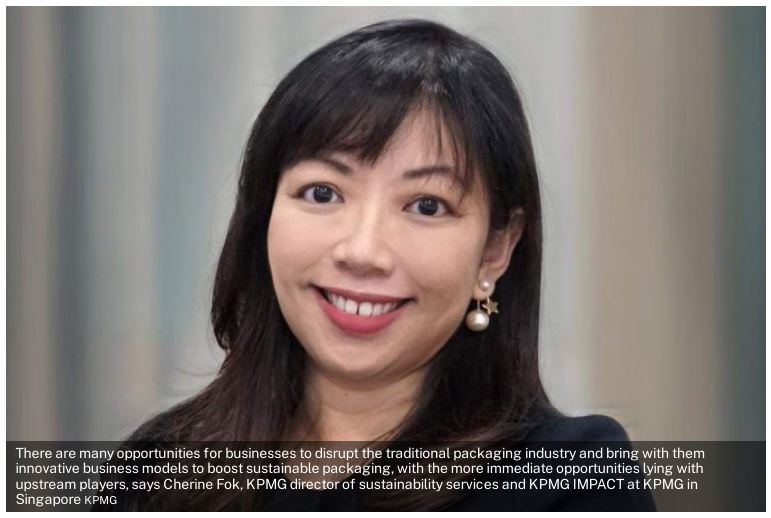Sustainable packaging in Singapore: the potential & opportunities
AS consumers, many of us are aware that packaging makes up a significant portion of the waste we produce and that, while our attitudes and behaviours play a part, the options available to us – in terms of the type of packaging and recycling options available – are also important.
In Singapore, efforts are continually being made to reduce packaging waste and to transform practices into more sustainable ones. The Singapore Environment Council (SEC) found that, in 2021, the country generated a total of 6.94 million tonnes of solid waste.
Of this, 1.82 million tonnes consisted of domestic waste, which had to be incinerated. This contributed to over 11 million kilograms of carbon dioxide equivalent (KgCO2e), which the SEC said is equivalent to the emissions from a dumpster truck driving around the circumference of the Earth 352 times.
“In 2021, 523,000 tonnes, or S$1.8 billion worth, of domestic packaging waste was thrown out in Singapore. As Singapore moves towards a net-zero future, packaging waste will be one of Singapore’s top waste streams of concern,” said SEC chairman Isabella Huang-Loh.
The council has sought to find ways to improve packaging systems and practices here, with a view to boosting recycling and sustainability. In collaboration with professional services firm KPMG in Singapore, it studied current consumer attitudes around packaging and packaging waste, and sought to identify the opportunities for more effective packaging waste management.
Its study, “Unlocking Opportunities for Sustainable Packaging in Singapore”, covered over 1,000 responses from people from a range of household types, occupational statuses, ages, and income levels.
Consumer attitudes
It found that price was a major factor in consumers choosing more sustainable packaging. The bulk of respondents (95 per cent) said they would be inclined to purchase a product that has sustainable packaging – but, 53 per cent said they will only purchase sustainable packaging if it does not cost more, and 20 per cent said price is their only consideration in purchasing a product with sustainable packaging.
Cherine Fok, director of Sustainability Services and KPMG Impact at KPMG in Singapore, believes that tackling this issue would involve a more collaborative approach among industry players, to develop scalable solutions that are attractive and feasible.
“Businesses will need to look outside their traditional operating boundaries, including rethinking their packaging processes and systems. They will need to work more closely with the government, supply chains and consumers on efforts to address the carbon footprint across the life cycle. This could also necessitate more investments into exploring new technologies and green innovation.
“Hence, for industry players to buy in, costs will need to be spread out equitably. It will not be realistic to expect only businesses to bear the brunt of it. Government incentives, through tax relief and R&D (research and development) grants to support businesses in having the right capabilities and infrastructure, will also be critical.”
Respondents also indicated that greater awareness and more convenient recycling solutions would help them make better decisions.
Over half cited the insufficient information on sustainable packaging and its benefits, which could explain the lack of motivation for choosing sustainable alternatives. Many respondents (78 per cent) also cited the lack of clear labelling as inhibiting them from making better decisions, as they are unable to discern the recyclability of packaging based on the information found on it.
Consumers also said they would be turned off from recycling depending on: the effort needed to wash and clean recyclables (23 per cent); the uncertainty of what can separate recyclables from other waste (21 per cent); and bringing recyclables to the recycle bin (15 per cent). When asked if they would actively participate in a take-back scheme, 80 per cent cited the convenience and accessibility of collection points as an important condition.
Huang-Loh commented: “With 7 in 10 consumers not having a full understanding of what materials can and cannot be recycled, consumer education will be paramount in addressing the issue. Our study also revealed that government initiatives will have to be complemented with deliberate corporate action and innovation in order to address waste management, and set Singapore on track to achieving sustainability in the packaging industry. ”
Business opportunities
The SEC’s study found there was an urgent need for businesses to explore more sustainable options for packaging, and highlighted opportunities for businesses to rethink their packaging game. The majority of respondents (70 per cent) said there should be a reduction in packaging material for most of the products that they buy.
The SEC believes this insight could help businesses cut costs in product packaging, which can then be passed on to customers.
Fok says there are “plenty” of opportunities for businesses, especially new entrants, to disrupt the traditional packaging industry and bring with them innovative business models to boost sustainable packaging, given that the market remains relatively new and current initiatives remain limited.
“The more immediate opportunities in sustainable packaging lie with upstream players, such as manufacturers and suppliers, in terms of the redesign of packaging and reduction in the use of materials. However, there may still be challenges around whether recycling rates can be increased downstream and if there will be sufficient volume for economies of scale. This will require a change in consumer behaviour for the sustainable packaging market to be truly viable.
“In the long term, achieving commercial viability and price parity with products of other materials will be key challenges for the industry. It may take collective industry effort to boost private and public education, even as supporting policies such as sustainability labelling are developed, alongside green innovations and cost sharing mechanisms,” Fok added.
Source: https://www.businesstimes.com.sg/companies-markets/sustainable-packaging-in-singapore-the-potential-opportunities


 Thailand
Thailand




